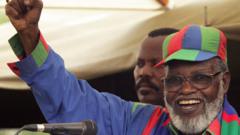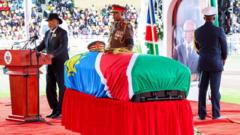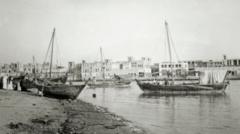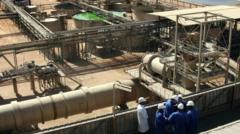**Sam Nujoma, who led Namibia's liberation struggle against apartheid and became the nation's first president, dies at the age of 95, heralding immense national sorrow.**
**Honoring Sam Nujoma: Namibia's Revolutionary Patriarch Passes Away**

**Honoring Sam Nujoma: Namibia's Revolutionary Patriarch Passes Away**
**The icon of Namibia's independence and founding father has died, leaving behind a legacy of resilience and unity.**
Sam Nujoma, a pivotal figure in Namibia’s history and a symbol of the nation's liberation struggle, has passed away at the age of 95. His death, announced by President Nangolo Mbumba, comes after a three-week hospitalization due to health issues, leaving the country in mourning.
Known affectionately as the "father of the nation," Nujoma played a critical role in transitioning Namibia from a colony subjected to colonial brutality to a sovereign nation. His approachable demeanor made him relatable to citizens; he often participated in local events and encouraged personal connections, striving to remain grounded despite his prominence.
Nujoma's journey to independence was fraught with adversity and sacrifices. Born into a peasant family in the northern village of Etunda, he experienced the harsh realities of colonialism firsthand. He became politically active in the late 1950s, stepping into leadership in the Owamboland Peoples Organisation, a precursor to the Swapo movement, which advocated for Namibian independence.
The backdrop to his fight was harrowing. Namibia was historically oppressed first by German colonial rulers responsible for mass atrocities – events that some label as the first genocide of the 20th century – and subsequently by the apartheid regime of South Africa. The brutal conflict began in 1966, with Nujoma leading the guerilla tactics against the oppressive system, which drew international attention and highlighted the struggle of the Namibian people.
In his pursuit of liberation, Nujoma faced numerous challenges, including exile and the accusations from South African leaders branding him as a "Marxist terrorist." Despite these obstacles, he sought global support for his cause, even addressing the United Nations. His leadership during the liberation struggle involved strategic partnerships with various international allies including Cuba, which significantly aided in the military confrontation against South African forces.
Post-independence, following Namibia's freedom in 1990, Nujoma was elected as the first president of the newly independent nation. He focused on progressive reforms aimed at improving the lives of the underprivileged, particularly children and women, even enacting laws that demanded contributions from absent fathers toward child support.
Despite his significant contributions, his presidency faced challenges including allegations of authoritarianism as well as criticism for amending the constitution to extend his rule. Nevertheless, Nujoma remained a prominent figure advocating for national unity and reconciliation among diverse ethnic communities in Namibia.
Transitioning power in 2005, Nujoma continued to influence national politics behind the scenes. The appreciation for his leadership persisted, and in recognition of his contributions, the Namibian parliament named him the "Founding Father of Namibia" in 2005. He received several international accolades, affirming his role as a pivotal figure in promoting peace and democracy.
In recent years, Nujoma preferred a quieter life, dedicating time to his family, yet his legacy remains alive in the hearts of many Namibians. As the nation reflects on the loss of this remarkable leader, his vision for a united and thriving Namibia will undoubtedly endure through the generations to come.























